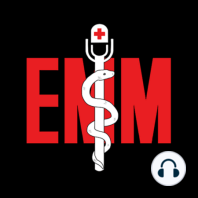2 min listen

Opioid Miniseries Part II: Limiting Opioids in the Emergency Department
Opioid Miniseries Part II: Limiting Opioids in the Emergency Department
ratings:
Length:
69 minutes
Released:
Jun 8, 2017
Format:
Podcast episode
Description
RACTICE RECOMMENDATIONS 1. Opioids are inherently dangerous, highly addictive drugs with significant abuse potential, numerous side effects, lethality in overdose, rapid development of tolerance, and debilitating withdrawal symptoms. They should be avoided whenever possible and, in most cases, initiated only after other modalities of pain control have been trialed. 2. Prior to prescribing an opioid, physicians should perform a rapid risk assessment to screen for abuse potential and medical comorbidities. Alternative methods of pain control should be sought for patients at increased risk for abuse, addiction, or adverse reactions. 3. Emergency physicians should frequently consult Colorado’s prescription drug monitoring program (PDMP) to assess a patient’s history of prescription drug abuse, misuse, or diversion. 4. Emergency physician groups should strongly consider tracking, collecting, and sharing individual opioid prescribing patterns with their clinicians to decrease protocol variabilities. 5. Strongly consider removing prepopulated doses of opioids from order sets in computerized provider order entry (CPOE) systems. 6. Opioid alternatives and nonpharmacological therapies should be used to manage patients with acute low back pain, in whom opioids are particularly detrimental. Opioids should be prescribed only after alternative treatments have failed. 7. Potential drug interactions must be evaluated, and opioids should be avoided in patients already taking benzodiazepines, barbiturates, or other narcotics. 8. Patients with chronic pain should receive opioid medications from one practice, preferably their primary care provider or pain specialist. Opioids should be avoided in the emergency department treatment of most chronic conditions. Emergency physicians should coordinate care with a patient’s primary care or pain specialist whenever possible, and previous patient-physician contracts regarding opioid use should be honored. 9. Clinicians should abstain from adjusting opioid dosing regimens for chronic conditions and avoid routinely prescribing opioids for acute exacerbations of chronic noncancer pain. 10. “Long-acting” or “extended-release” opioid products should be avoided for the relief of acute pain. 11. Patients receiving controlled medication prescriptions should be able to verify their identity. 12. Patients who receive opioids should be educated about their side effects and potential for addiction, particularly when being discharged with an opioid prescription. 13. When considering opioids, clinicians should prescribe the lowest possible effective dose in the shortest appropriate duration (eg, <3 days). 14. Emergency departments should refuse to refill lost or stolen opioid prescriptions. POLICY RECOMMENDATIONS 1. As has been done in other states, the Colorado PDMP should develop an automated query system that can be more readily integrated into electronic health records and accessed by emergency clinicians. 2. Pain control should be removed from patient satisfaction surveys, as they may unfairly penalize physicians for exercising proper medical judgement. 3. Opioid prepacks should be avoided or eliminated in the emergency department if 24-hour pharmacy support is available. 4. Pain should not be considered the “fifth vital sign.”
Released:
Jun 8, 2017
Format:
Podcast episode
Titles in the series (100)
REBOA: Introduction of the use of REBOA for hemorrhagic shock. by Emergency Medical Minute